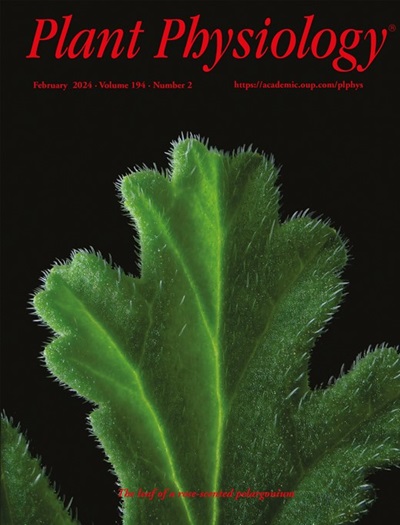Transcription Factor OsMYB2 Triggers Amino Acid Transporter OsANT1 expression to Regulate Rice Growth and Salt Tolerance
IF 6.5
1区 生物学
Q1 PLANT SCIENCES
引用次数: 0
Abstract
Amino acid transporters play important roles in plant growth and stress tolerance; however, whether the abscisic acid signaling pathway regulates their transcription in rice (Oryza sativa) under salt stress remains unclear. In this study, we report that the transcription factor OsMYB2 (MYB transcription factor 2) of the abscisic acid signaling pathway mediates the expression of the gene encoding the amino acid transporter OsANT1 (aromatic and neutral amino acid transporter 1), which positively regulates growth and salt tolerance in rice. OsANT1 was mainly expressed in the leaf blade and panicle under normal conditions and transports leucine, phenylalanine, tyrosine and proline, positively regulating tillering and yield in rice. Nevertheless, salt stress induced the accumulation of abscisic acid and strongly increased the expression level of OsANT1 in the root, resulting in enhanced salt tolerance of rice seedlings, as evidenced by higher proline concentration and antioxidant-like enzyme activities and lower malondialdehyde and hydrogen peroxide concentrations. Moreover, we showed that OsMYB2 interacts with the promoter of OsANT1 and promotes its expression. Overexpression of OsMYB2 also improved tillering, yield, and salt tolerance in rice. In conclusion, our results suggest that the transcription factor OsMYB2 triggers OsANT1 expression and regulates growth and salt tolerance in rice, providing insights into the role of the abscisic acid signaling pathway in the regulatory mechanism of amino acid transporters in response to salt stress.转录因子 OsMYB2 触发氨基酸转运体 OsANT1 的表达以调控水稻的生长和耐盐性
氨基酸转运体在植物生长和抗逆性中发挥着重要作用;然而,赤霉酸信号途径是否调控盐胁迫下水稻(Oryza sativa)中氨基酸转运体的转录仍不清楚。本研究报告了赤霉酸信号通路的转录因子 OsMYB2(MYB 转录因子 2)介导了氨基酸转运体 OsANT1(芳香族和中性氨基酸转运体 1)的编码基因的表达,而 OsANT1 对水稻的生长和耐盐性具有正向调节作用。正常情况下,OsANT1 主要在叶片和圆锥花序中表达,转运亮氨酸、苯丙氨酸、酪氨酸和脯氨酸,对水稻的分蘖和产量有正向调节作用。然而,盐胁迫会诱导脱落酸的积累,并强烈提高 OsANT1 在根部的表达水平,从而增强水稻幼苗的耐盐性,这表现在较高的脯氨酸浓度和抗氧化酶活性以及较低的丙二醛和过氧化氢浓度。此外,我们还发现 OsMYB2 与 OsANT1 的启动子相互作用并促进其表达。过表达 OsMYB2 还能改善水稻的分蘖、产量和耐盐性。总之,我们的研究结果表明,转录因子 OsMYB2 触发 OsANT1 的表达,并调控水稻的生长和耐盐性,为研究脱落酸信号通路在氨基酸转运体应对盐胁迫的调控机制中的作用提供了深入的见解。
本文章由计算机程序翻译,如有差异,请以英文原文为准。
求助全文
约1分钟内获得全文
求助全文
来源期刊

Plant Physiology
生物-植物科学
CiteScore
12.20
自引率
5.40%
发文量
535
审稿时长
2.3 months
期刊介绍:
Plant Physiology® is a distinguished and highly respected journal with a rich history dating back to its establishment in 1926. It stands as a leading international publication in the field of plant biology, covering a comprehensive range of topics from the molecular and structural aspects of plant life to systems biology and ecophysiology. Recognized as the most highly cited journal in plant sciences, Plant Physiology® is a testament to its commitment to excellence and the dissemination of groundbreaking research.
As the official publication of the American Society of Plant Biologists, Plant Physiology® upholds rigorous peer-review standards, ensuring that the scientific community receives the highest quality research. The journal releases 12 issues annually, providing a steady stream of new findings and insights to its readership.
 求助内容:
求助内容: 应助结果提醒方式:
应助结果提醒方式:


